#Postdoctoral Fellowship
Text
Top Research Areas for Postdoctoral Fellowships in Education
Embark on an exploratory journey into the future of education with our deep dive into the best research areas for postdoctoral fellowships. From the transformative potential of Educational Technology to the inclusive strategies of Inclusive Education, STEM advancements, Teacher Education, and the critical role of Education Policy and Reform, this video is designed for recent Ph.D. graduates and…

View On WordPress
0 notes
Text
Jeong Min Park earns 2024 Schmidt Science Fellowship
New Post has been published on https://thedigitalinsider.com/jeong-min-park-earns-2024-schmidt-science-fellowship/
Jeong Min Park earns 2024 Schmidt Science Fellowship
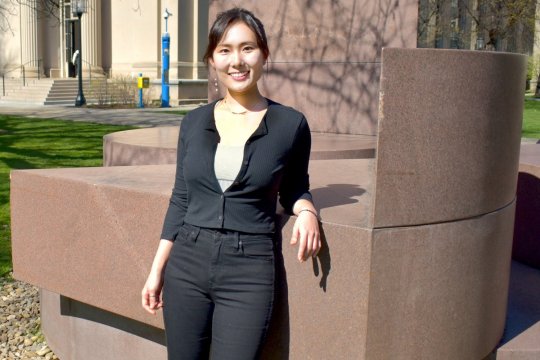

Physics graduate student Jeong Min (Jane) Park is among the 32 exceptional early-career scientists worldwide chosen to receive the prestigious 2024 Schmidt Science Fellows award.
As a 2024 Schmidt Science Fellow, Park’s postdoctoral work will seek to directly detect phases that could host new particles by employing an instrument that can visualize subatomic-scale phenomena.
With her advisor, Pablo Jarillo-Herrero, the Cecil and Ida Green Professor of Physics, Park’s research at MIT focuses on discovering novel quantum phases of matter.
“When there are many electrons in a material, their interactions can lead to collective behaviors that are not expected from individual particles, known as emergent phenomena,” explains Park. “One example is superconductivity, where interacting electrons combine together as a pair at low temperatures to conduct electricity without energy loss.”
During her PhD studies, she has investigated novel types of superconductivity by designing new materials with targeted interactions and topology. In particular, she used graphene, atomically thin two-dimensional layers of graphite, the same material as pencil lead, and turned it into a “magic” material. This so-called magic-angle twisted trilayer graphene provided an extraordinarily strong form of superconductivity that is robust under high magnetic fields. Later, she found a whole “magic family” of these materials, elucidating the key mechanisms behind superconductivity and interaction-driven phenomena. These results have provided a new platform to study emergent phenomena in two dimensions, which can lead to innovations in electronics and quantum technology.
Park says she is looking forward to her postdoctoral studies with Princeton University physics professor Ali Yazdani’s lab.
“I’m excited about the idea of discovering and studying new quantum phenomena that could further the understanding of fundamental physics,” says Park. “Having explored interaction-driven phenomena through the design of new materials, I’m now aiming to broaden my perspective and expertise to address a different kind of question, by combining my background in material design with the sophisticated local-scale measurements that I will adopt during my postdoc.”
She explains that elementary particles are classified as either bosons or fermions, with contrasting behaviors upon interchanging two identical particles, referred to as exchange statistics; bosons remain unchanged, while fermions acquire a minus sign in their quantum wavefunction.
Theories predict the existence of fundamentally different particles known as non-abelian anyons, whose wavefunctions braid upon particle exchange. Such a braiding process can be used to encode and store information, potentially opening the door to fault-tolerant quantum computing in the future.
Since 2018, this prestigious postdoctoral program has sought to break down silos among scientific fields to solve the world’s biggest challenges and support future leaders in STEM.
Schmidt Science Fellows, an initiative of Schmidt Sciences, delivered in partnership with the Rhodes Trust, identifies, develops, and amplifies the next generation of science leaders, by building a community of scientists and supporters of interdisciplinary science and leveraging this network to drive sector-wide change. The 2024 fellows consist of 17 nationalities across North America, Europe, and Asia.
Nominated candidates undergo a rigorous selection process that includes a paper-based academic review with panels of experts in their home disciplines and final interviews with panels, including senior representatives from across many scientific disciplines and different business sectors.
#2024#America#Asia#Awards#honors and fellowships#background#Building#Business#Carbon materials#career#change#Collective#Community#computing#Design#dimensions#electricity#Electronics#electrons#energy#Europe#Fault-tolerant quantum computing#form#Fundamental#Future#Graduate#postdoctoral#graphene#graphite#green
1 note
·
View note
Text
NASA Awards Astrophysics Postdoctoral Fellowships for 2024
The highly competitive NASA Hubble Fellowship Program (NHFP) recently named 24 new fellows to its 2024 roster. The program fosters excellence and inclusive leadership in astrophysics by supporting a diverse group of exceptionally promising and innovative early-career astrophysicists. The NHFP enables outstanding postdoctoral scientists to pursue independent research in any area of NASA Astrophysics, using […]
from NASA https://ift.tt/IR5pgui
0 notes
Photo
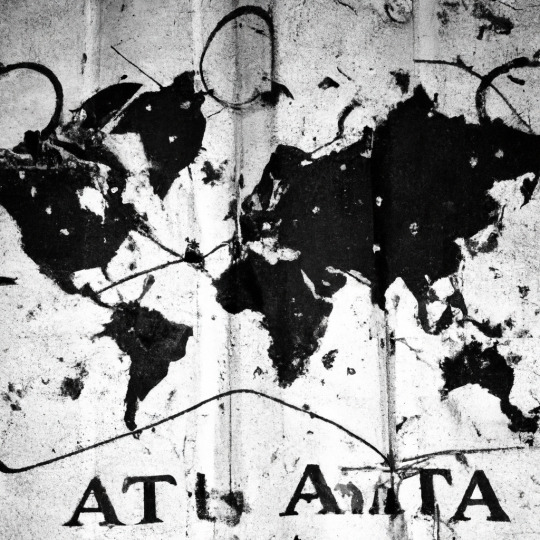
The whisper of a program's impact spreads quickly. In the beginning, it was only a relative handful of students who had the heart to follow the path of the Three Tata Fellows. But soon, a ripple of change began to spread, as more and more people heard of their plight and the way they dedicated themselves to improving the world. The Three Tata Fellows seemed to almost exist in two worlds at once - the one experienced by their fellow peers, and one seen only by them. They lived life on a higher level than most could understand, and operated with a level of understanding and insight that was unparalleled. Each of the Three Tata Fellows had achieved extraordinary things in the real world - inspiring others with their passion and commitment to the cause - but all had experienced a transformation of sorts during their involvement in the program. What began as a simple program of learning and growth had evolved into something much more - a way of life that impacted not only themselves, but the world around them.
#Interview#Students#Graduate#postdoctoral#Awards#honors and fellowships#Energy#Renewable energy#Batteries#Emissions#Climate change#Sustainability#Policy#Technology and policy#Government#International initiatives#Developing countries#Social justice#Cleaner industry#Electric vehicles#Tata Center#MIT Energy Initiative#MIT Schwarzman College of Computing#fault#Tata fellows#program impact#lives#movement#world
1 note
·
View note
Text
TWAS-IsDB Postdoctoral Fellowship Programme 2023 (Funded)
TWAS-IsDB Postdoctoral Fellowship Programme 2023 (Funded)
Deadline: March 6. 2023
Applications for the TWAS-IsDB Postdoctoral Fellowship Programme 2023 are now open. Early-career researchers from the 21 least developed member countries of the Islamic Development Bank (IsDB) are eligible for an ambitious new postdoctoral programme offered by IsDB and TWAS.
The fellowships support research related to the United Nations Sustainable Development Goals,…
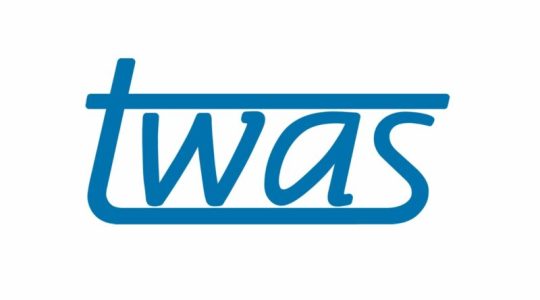
View On WordPress
0 notes
Photo
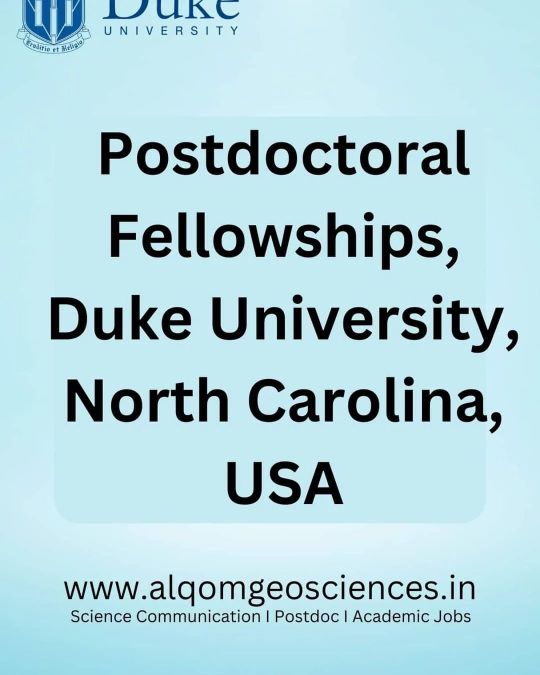
Apply Link https://tinyurl.com/postdoc-fellowships #postdoc #postdoctoral #postdocposition #postdoctoralfellowship #postdocs #postdocjobs #postdoctorate #fellowship #fellowships #fellowshipprogram #malaysia #uk #postdocinus #Cameroon #Jordan #jobalert (at California) https://www.instagram.com/p/CkoLsi4NG78/?igshid=NGJjMDIxMWI=
#postdoc#postdoctoral#postdocposition#postdoctoralfellowship#postdocs#postdocjobs#postdoctorate#fellowship#fellowships#fellowshipprogram#malaysia#uk#postdocinus#cameroon#jordan#jobalert
0 notes
Text
JOB ALERT: MSCA-PF Joint application at the University of Granada (Spain) Department of Prehistory and Archaeology
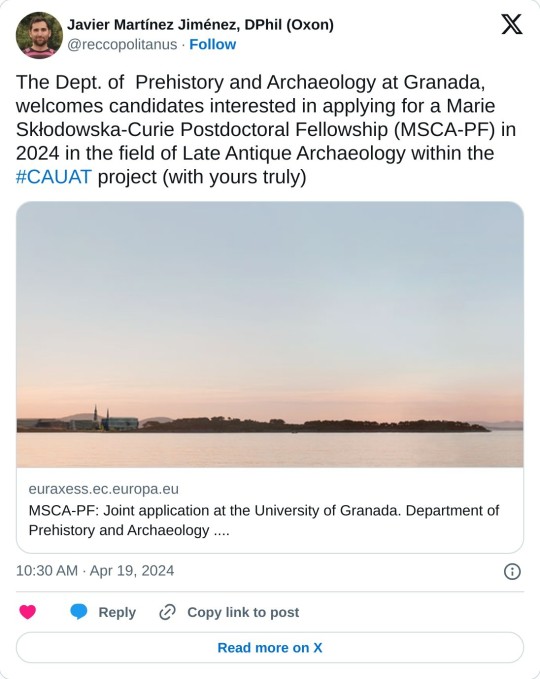
If anyone is interested in a two-year MSCA Postdoctoral Fellowship at the University of Granada within the field of late antique archaeology, please check this link with the basic information.
#Archaelogy#Acedemia#graduate job#postdoctoral job#late antiquity#if anyone applies and mentions they saw this on tumblr they'll get all my support forever
53 notes
·
View notes
Text
Story: I'm a Method Cashier!
And this was a role I could really sink my teeth into.
Okay, so, first of all, to work at Store there are 2 online applications, an online training course, 3 questionnaires for your references to fill out, 3 interviews (2 alone and 1 group), a background check, an unpaid 4-hr. orientation, a drug test, a pacer test, a polygraph test administered by an F.B.I. agent (and not like the sexy ones on Criminal Minds), a blood oath, and you have to be able to put on lipstick like Molly Ringwald in The Breakfast Club. Jesus, there are less requirements to be elected president. And a cult wouldn't make you jump through this many hoops to join.
My Marketable Skills: I'm a warm body and I'm not an asshole. I'm not going to say "we should hang out outside of work" to my coworkers or mouth off to the customers. Basically, you should hire me because you could do a whole lot worse.
But I couldn't just say that. I couldn't just be honest. It had to be, with tears glistening in my eyes: "It has been my lifelong dream to be a cashier at Store. Cashiering is my passion. I have 3 Ph.D.s in Applied Cashiering, Cashiering Theory, and Experimental Cashiering from Harvard University's School of Cashiering, and I completed a postdoctoral fellowship at Oxford University's St. Cashier Cashiering College. I have 97 years of experience in the field."
So, I get there, for the first interview, in my silly little outfit, mostly stolen from my mom's closet. I walk in and say excuse me to the first employee I see. She clutches her chest, looks bewildered, and says "excuse me" back.
Daniella, apprehensively: "Hi, I'm here for an interview, could I speak to a manager please?"
Employee #1, startled: "Yeah." She walks off and I assume I'm meant to follow her.
My real name sounds vaguely similar to the name of a character from a classic poem you read the Wikipedia summary of in ninth grade English class. The first five letters are the same, but the character's name ends with an a, and mine with an e. Anyway, while we were walking, we introduced ourselves and she said, and I've never have cause to use the word "chortling" before, but if there was ever a time, it was then, "Well, your mother must have been a big The Poet fan, huh?" (as if I've never heard that one before). I mustered a polite chuckle and said nothing.
Employee #1, sneering: "You have no idea what I'm talking about, do you?"
Daniella, wishing for death: "No, I know the poem."
Employee #1, under her breath: "Big deal."
The rest of the walk is silent. We turn a corner and see a boy about my age. She starts calling his name, he fully makes eye contact with her, and then turns and speedwalks away. She keeps calling after him and picks up the pace to reach him, but he outruns her. No need to watch the documentary through your fingers, the antelope is safe this time. It turns out he wasn't even the manager, because I meet her next. The interview goes okay and I get the second one. I ask a different employee this time. She says into her walkie-talkie, "Anthony, Daniella is here for an interview, do you want to deal with that?"
Anthony comes be-bopping up to me at 1,000 mph. When he's still several aisles away, he calls out "Hi, Friend!!" in an acoustic guitar-playing youth pastor voice. He leads me to the office, racing down the aisles like there's an serial killer revving a chainsaw behind him, and by the time I catch up in my pencil skirt and heels, I'm panting and sweating. Maybe this is part of the interview: seeing if you can keep up metaphorically and literally. The weakest shall be sacrificed.
Tony asks me, not why I want to work at Store, but why I want to work in general, as if earning money to eat is a casual hobby, like knitting. He asks me if I've applied anywhere else, like Store is a jealous girlfriend. Then he asks me if I have any questions, and I know you're supposed to have something, so I pull a couple out my ass. After he answers them, he asks if I have any more, and, thinking I'm out of the woods, I say not for now.
Anthony, ominously: "You sure?" Slowly pan back to Daniella.
Daniella, brightly: "I'm sure I'll have more during orientation if I'm hired, but I think I'm covered for now. Thank you!"
(Beat.) Anthony: "Well, you know, I'm just gonna give you some advice: you really should have more questions. But don't worry, I'm gonna go ahead and tell you a little bit more about how the Store family does things."
45 minutes later, he asks for a third set of questions, and then, believe or not, a fourth. Sir, this is my interview. You're not a celebrity guest on The Fucking Tonight Show. If you're so desperate for me to ask you questions, why don't you apply to this job? Or do like the rest of us and pretend you're on Ricki Lake talking about how brave you are to share the story of your divorce from Tim McGraw and how it inspired your new album, "Warm Regards, Dani," currently topping the country charts while you shampoo your hair.
Three business days later, my email: "Congratulations! You have been selected to join the Store Family! Please report for orientation next Wednesday at noon."
Another day, another dollar.
#jobs#working#employment#work#job search#career#jobsearch#jobseekers#cashier#retail#customer service#service#shift work#funny post#funny#funny stuff#funny shit#humor#lol#jokes#haha
24 notes
·
View notes
Text
Linguistic Jobs: Interview with a Data Manager & Digital Archivist
This month’s interview is with Julia Miller, a Data Manager and Digital Archivist who uses their Linguistics background to archive high-quality endangered language materials. As a recent PhD graduate, I greatly appreciated Julia’s validating advice that the absence of a tenure-track position or a position in the tech industry does not qualify as “failing”. This message is on-brand for this series, as one of the intentions behind these interviews is to demonstrate that Linguistics training is applicable to lots of jobs, not just the academic ones. Additionally, this interview contains some refreshing and practical advice regarding postdoc and PhD management.
You can follow Julia on Twitter @Spectregraph.
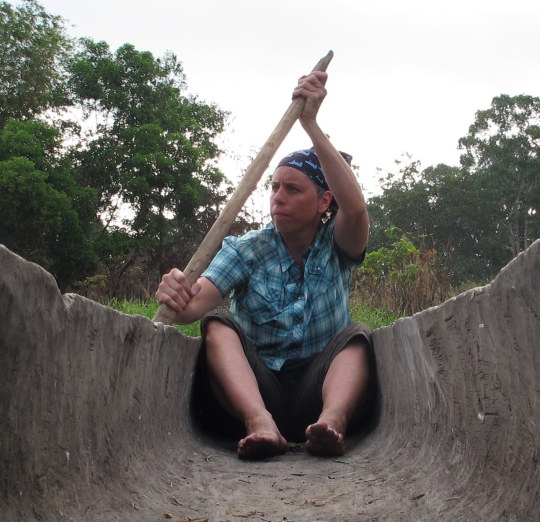
What did you study at university?
I began my undergrad studies in Portland, focusing on art (printmaking) and languages (Russian, French, German, later adding Arabic and Latin). I loved languages and exploring the patterns; at this point I didn’t know about Linguistics. After a short break from school and a bit of reflection, I moved to Seattle, enrolled at the University of Washington, switched my area of study to Linguistics and ended up getting the hat-trick of degrees in Linguistics all from UW: BA (1998), MA (2003), and PhD (2013). My research focused on acoustic phonetics and sociolinguistics; my PhD project explored acoustic properties of lexical tone in two dialects of the Dene language Dane-zaa, spoken in NE British Columbia. During my MA and PhD studies, I was fortunate to have been part of the DOBES Documentation of Endangered Languages program, working on a collaborative documentation project of the Dane-zaa (Beaver) language, which offered funding for tuition and fieldwork, as well as providing me with training in field methods, language documentation & description, and archiving. When I was in the final stages of writing my PhD thesis, I relocated to Australia and began working with PARADISEC, based at their node at the Australian National University (ANU), in order to expand what I knew about digital language archives, building upon what I learned working with the Language Archive for the Beaver DOBES project. I then received a Postdoctoral fellowship at the ANU**, working on another DOBES-funded collaborative documentation project, working with the languages of the Morehead District, Nen, Komnzo, Idi, Nmbo, spoken in the Western Province in Papua New Guinea. The postdoc work included phonetic analyses, sociolinguistic interviews, mapping projects, as well data management and archiving. Despite my love of phonetic description and social network analysis, by the time I submitted my PhD thesis, it was clear that I was more interested in data management and archiving than in linguistic analyses. This was a difficult, yet freeing revelation.
**I do NOT suggest starting a postdoc when you are still writing your completely unrelated PhD thesis! I submitted my thesis in between field trips to PNG.
What is your job?
I am the senior data manager for the ARC Centre of Excellence for the Dynamics of Language (CoEDL) as well as a digital archivist for the Pacific and Regional Archive for Digital Sources in Endangered Cultures (PARADISEC). I facilitate the archiving of indigenous and minority language digital material collected by CoEDL members and affiliates from the region, as well as other PARADISEC depositors world-wide. I offer training for researchers, students, and anyone interested in data management and archiving procedures. I liaise with other archives, cultural institutions, and language centres for collaboration. Despite not holding an academic position, teaching is still a large part of my daily work; I offer guest lectures in Field Methods and Digital Humanities courses and run intensive training sessions in digital archiving and data management for university researchers and job placement participants. I have developed curricula, technical workflows and archiving best-practice advice for audiences with different skillsets and goals. I also manage audio and manuscript digitising studios, where we digitise audio cassettes, reel-to-reel tapes, and field notebooks, etc. and I maintain a lending library of field equipment and offer training and advice.
How does your linguistics training help you in your job?
It would appear that my entire PhD path has prepared me for my current job. All the training I received in fieldwork, collaborative research, language documentation & description, and archiving allows me to understand the work our depositors are carrying out. I can offer informed advice and try to anticipate issues they may face in the field regarding data management, equipment failures, etc. And having archived my own materials in multiple archives, I can offer commiseration (and advice) as someone who has had to create metadata databases, follow strict formatting guidelines for A/V files, and adhere to deadlines based on funding agreements.
What was the transition from university to work like for you?
I am still working at a university, but the transition from an academic role to what is considered a non-academic role has been a bit of a challenge. I find I still do a lot of research for my work, and then try to pass on what I have learned in training modules and technical writing projects. I am fortunate to be in an environment that allows me to carry out what could be considered ‘supplemental’ work. Knowing that teaching and outreach are very important to me will help me on my career path as it evolves.
Do you have any advice you wish someone had given to you about linguistics/careers/university?
As a MA/PhD student, I would have loved to have been told of career options outside of Academia (or Big Tech), or even just been reassured that it is a valid option to not pursue tenure track jobs. I think many of my cohorts and I felt as if we failed or let down our professors by not getting a tenure track position in Linguistics. I’m glad to see that the culture of academia is changing and that there is support and advice made more available to students now.
Related interviews:
Interview with a Metadata Specialist and Genealogist
Interview with a Data Scientist
Interview with a Museum Curator
Interview with a Librarian
Interview with a Computational Linguist
Recent interviews:
Interview with a Natural Language Annotation Lead
Interview with an EMLS/Linguistics instructor & mother of four
Interview with a Performing Artiste and Freelance Editor
Interview with a Hawaiian and Tahitian language Instructor, Translator & Radio Host
Interview with a Customer Success Manager
Resources:
The full Linguist Jobs Interview List
The Linguist Jobs tag for the most recent interviews
The Linguistics Jobs slide deck (overview, resources and activities)
The Linguistics Jobs Interview series is edited by Martha Tsutsui Billins. Martha is a linguist whose research focuses on the Ryukyuan language Amami Oshima, specifically honourifics and politeness strategies in the context of language endangerment. Martha runs Field Notes, a podcast about linguistic fieldwork.
#data management#digital archivist#digital archiving#language archiving#endangered language archiving#ling jobs#linguist#language#linguistics#linguistics jobs#archiving
104 notes
·
View notes
Text
I was tagged by @fluencylevelfrench, thank you!
last song? - Savage Ga$p x KAMAARA ft Witchouse 40k - blood+
favourite colour? - dark red
last movie/tv show? - The Girl From the Other Side / とつくにの少女
(highly recommend!)
currently watching? - Old Awful Squad (PUBG) stream videos from Polygon
sweet/spicy/savoury? - it really depends but i think most consistently savory
relationship status? - single
current obsession? - ramen where you make the broth with peanut butter
last thing i googled? - LOL this is tragic: Postdoctoral Teaching Fellowship [school name]
I'm tagging: anyone who wants to !
(because I'm lazy, but do feel free to tag me in it to see)
#tag games#could not think of any particular obsessions but i AM very much in my peanut butter ramen phase again so that counts
4 notes
·
View notes
Text
Twenty-three MIT faculty honored as "Committed to Caring" for 2023-25
New Post has been published on https://thedigitalinsider.com/twenty-three-mit-faculty-honored-as-committed-to-caring-for-2023-25/
Twenty-three MIT faculty honored as "Committed to Caring" for 2023-25
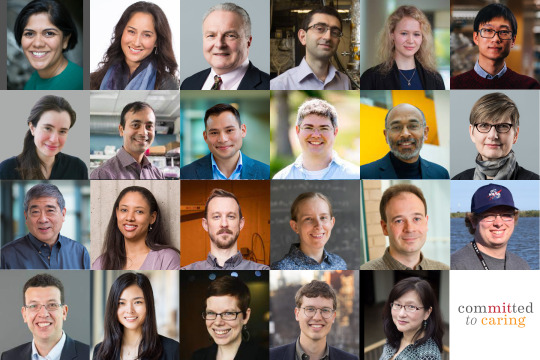

In the halls of MIT, a distinctive thread of compassion weaves through the fabric of education. As students adjust to a postpandemic normal, many professors have played a pivotal role by helping them navigate the realities of hybrid learning and a rapidly changing postgraduation landscape.
The Committed to Caring (C2C) program at MIT is a student-driven initiative that celebrates faculty members who have served as exceptional mentors to graduate students. Twenty-three MIT professors have been selected as recipients of the C2C award for 2023-25, marking the most extensive cohort of honorees to date. These individuals join the ranks of 75 previous C2C honorees.
The actions of these MIT faculty members over the past two years underscore their profound commitment to the well-being, growth, and success of their students. These educators go above and beyond their roles, demonstrating an unwavering dedication to mentorship, inclusion, and a holistic approach to student development. They aim to create a nurturing environment where students not only thrive academically, but also flourish personally.
The following faculty members are the 2023-25 Committed to Caring honorees:
Hamsa Balakrishnan, Department of Aeronautics and Astronautics
Cynthia Breazeal, Media Lab
Roberto Fernandez, MIT Sloan School of Management
Nuh Gedik, Department of Physics
Mariya Grinberg, Department of Political Science
Ming Guo, Department of Mechanical Engineering
Myriam Heiman, Department of Brain and Cognitive Sciences
Rohit Karnik, Department of Mechanical Engineering
Erik Lin-Greenberg, Department of Political Science
Michael McDonald, Department of Physics
Emery Neal Brown, Harvard-MIT Program in Health Sciences and Technology
Wanda Orlikowski, MIT Sloan School of Management
Kenneth Oye, Department of Political Science
Kristala Prather, Department of Chemical Engineering
Zachary Seth Hartwig, Department of Nuclear Science and Engineering
Tracy Slatyer, Department of Physics
Iain Stewart, Department of Physics
Andrew Vanderburg, Department of Physics
Rodrigo Verdi, MIT Sloan School of Management
Xiao Wang, Department of Chemistry
Ariel White, Department of Political Science
Nathan Wilmers, MIT Sloan School of Management
Maria Yang, Department of Mechanical Engineering
Since the founding of the C2C program in 2014 by the Office of Graduate Education, the nomination process for honorees has centered on student involvement. Graduate students from all departments are invited to submit nomination letters detailing professors’ outstanding mentorship practices. A committee of graduate students and staff members then selects individuals who have shown genuine contributions to MIT’s vibrant academic community through student mentorship.
The selection committee this year included: Maria Carreira (Biology), Rima Das (Mechanical Engineering), Ahmet Gulek (Economics), Bishal Thapa (Biological Engineering), Katie Rotman (Architecture), Dóra Takács (Linguistics), Dan Korsun (Nuclear Science and Engineering), Leslie Langston (Student Mental Health and Counseling), Patricia Nesti (MIT-Woods Hole Oceanographic Institution), Beth Marois (Office of Graduate Education [OGE]), Sara Lazo (OGE), and Chair Suraiya Baluch (OGE).
This year’s nomination letters highlighted unique stories of how students felt supported by professors. Students noted their mentors’ commitment to frequent meetings despite their own busy personal lives, as well as their dedication to ensuring equal access to opportunities for underrepresented and underserved students.
Some wrote about their advisors’ careful consideration of students’ needs alongside their own when faced with professional advancement opportunities; others appreciated their active support for students in the LGBTQ+ community. Lastly, students reflected on their advisors’ encouragement for open and constructive discourse around the graduate unionization vote, showing a genuine desire to hear about graduate issues.
Baluch shared, “Working with the amazing selection committee was the highlight of my work year. I was so impressed by the thoughtful consideration each nomination received. Selecting the next round of C2C nominees is always a heartwarming experience.”
“As someone who aspires to be a faculty member someday,” noted Das, “being on the selection committee … was a phenomenal opportunity in understanding the breadth and depth of possibility in how to be a caring mentor in academia.”
She continued, “It was so heartening to hear the different ways that these faculty members are going above and beyond their explicit research and teaching duties and the amazing impact that has made on so many students’ well-being and ability to be successful in graduate school.”
The Committed to Caring program continues to reinforce MIT’s culture of mentorship, inclusion, and collaboration by recognizing the contributions of outstanding professors. In the coming months, news articles will feature pairs of honorees, and a reception will be held in May.
#2023#Aeronautical and astronautical engineering#aeronautics#amazing#approach#architecture#Articles#Awards#honors and fellowships#Biological engineering#Biology#Brain#Brain and cognitive sciences#chemical#Chemical engineering#chemistry#Collaboration#Community#Department of Political Science#development#Diversity and Inclusion#Economics#education#engineering#Environment#Faculty#Graduate#postdoctoral#growth#Harvard-MIT Health Sciences and Technology
0 notes
Text

Discovery tests theory on cooling of white dwarf stars
Open any astronomy textbook to the section on white dwarf stars and you’ll likely learn that they are “dead stars” that continuously cool down over time. New research published in Nature is challenging this theory, with the University of Victoria (UVic) and its partners using data from the European Space Agency’s Gaia satellite to reveal why a population of white dwarf stars stopped cooling for more than eight billion years.
“We discovered the classical picture of all white dwarfs being dead stars is incomplete,” says Simon Blouin, co-principal investigator and Canadian Institute of Theoretical Astrophysics National Fellow at UVic. “For these white dwarfs to stop cooling, they must have some way of generating extra energy. We weren’t sure how this was happening, but now we have an explanation for the phenomenon.”
Understanding the age and other aspects of white dwarf stars helps scientists reconstruct the formation of the Milky Way Galaxy. Using 2019 Gaia data, Blouin collaborated with Antoine Bédard of the University of Warwick and Institute for Advanced Study researcher Sihao Cheng to make the discovery.
Over 97 per cent of stars in the Milky Way will eventually become white dwarfs. Scientists have long considered these stars to be at the end of their lives. Having depleted their nuclear energy source, they stop producing heat and cool down until the dense plasma in their interiors freezes into a solid state, and the star solidifies from the inside out. This cooling process can take billions of years.
According to the new paper, in some white dwarfs, the dense plasma in the interior does not simply freeze from the inside out. Instead, the solid crystals that are formed upon freezing are less dense than the liquid, and therefore want to float. As the crystals float upwards, they displace the heavier liquid downward. The transport of heavier material toward the centre of the star releases gravitational energy, and this energy is enough to interrupt the star’s cooling process for billions of years.
“This is the first time this transport mechanism has been observed in any type of star, which is exciting, as it is not every day we uncover a whole new astrophysical phenomenon,” says Bédard, Research Fellow at the University of Warwick.
Why this happens in some stars and not others is uncertain, but Blouin thinks it is likely due to the composition of the star.
“Some white dwarf stars are formed by the merger of two different stars. When these stars collide to form the white dwarf, it changes the composition of the star in a way that can allow the formation of floating crystals,” says Blouin.
White dwarfs are routinely used as age indicators: the cooler a white dwarf is, the older it is assumed to be. However, due to the extra delay in cooling found in some white dwarfs, some stars of a given temperature may be billions of years older than previously thought.
“This new discovery will not only require that astronomy textbooks be revised but will also require that astronomers revisit the process they use to determine the age of stellar populations,” adds Blouin.
The research is supported by the National Sciences and Engineering Research Council of Canada (NSERC), the Banting Postdoctoral Fellowship program, the European Research Council, and the Canadian Institute for Theoretical Astrophysics (CITA).
3 notes
·
View notes
Photo
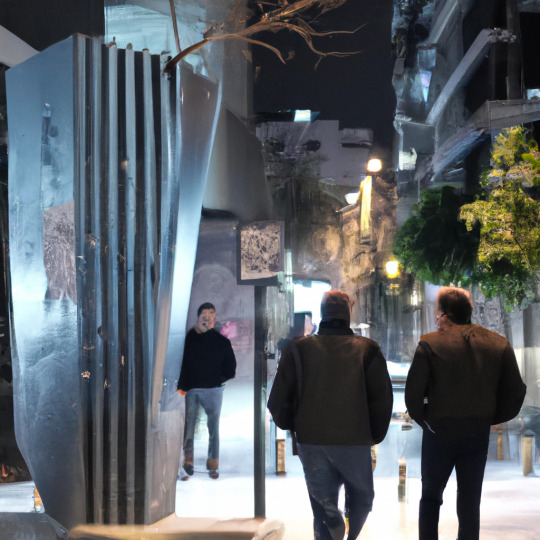
Question and answer session: Three Tata fellows discuss the program's impact on themselves and the world. What started as a chance to change their lives has become a movement to change the world.
#Interview#Students#Graduate#postdoctoral#Awards#honors and fellowships#Energy#Renewable energy#Batteries#Emissions#Climate change#Sustainability#Policy#Technology and policy#Government#International initiatives#Developing countries#Social justice#Cleaner industry#Electric vehicles#Tata Center#MIT Energy Initiative#MIT Schwarzman College of Computing#fault#Tata fellows#program impact#lives#movement#world
0 notes
Text
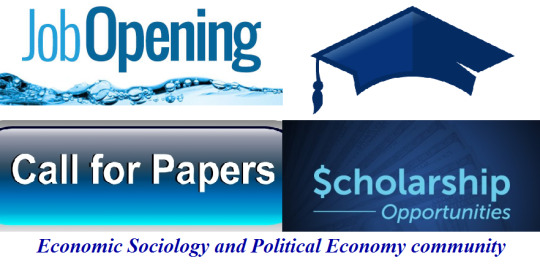
Dive into and benefit from this abundant and excellent list of great academic opportunities: 26 calls for papers for conferences (some are fully or partly funded) and special issues, 9 postdoctoral positions, 6 summer schools, 5 PhD scholarships, 2 job openings, a non-residential fellowship. Share and Good luck!
2 notes
·
View notes
Photo
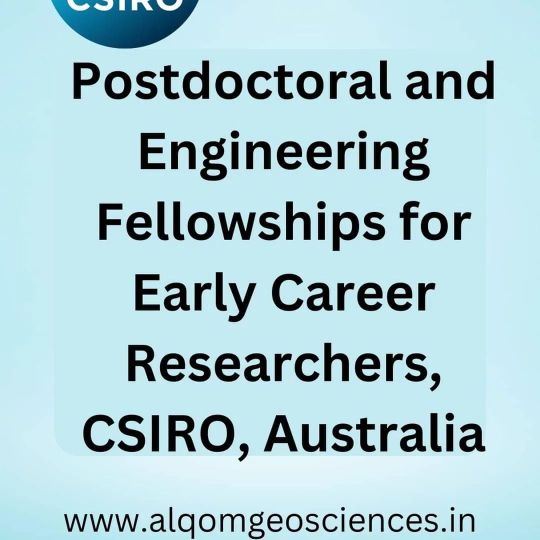
Apply Link 👉https://lnkd.in/dhh_V7qz For Application Link visit www.alqomgeosciences.in 🛑 Follow⏩ @aqknowledgehub 🔔 Activate Post Notifications 📢 Double Tap & Tag your Friends --------------------------------------------- Visit the website 📱💻 www.alqomgeosciences.in (Link in Bio) 📌 Geosciences 📌 Palaeontology 📌 PhD, Post-doc & Job Opportunities ----------------------------------------------- Postdoctoral and Engineering Fellowships for Early Career Researchers, CSIRO, Australia #postdoc #postdoctoral #postdocposition #postdoctoralfellowship #postdocs #postdocjobs #postdoctorate #fellowship #fellowships #fellowshipprogram #malaysia #uk #usa #researchers #research #science #csiro #australia #Cameroun #jordans #jobs #jobsearch #jobhunt #jobhunting #jobalert #job #jobopportunity #jobopportunities #career #engineering (at California) https://www.instagram.com/p/CkoK7yvtM9D/?igshid=NGJjMDIxMWI=
#postdoc#postdoctoral#postdocposition#postdoctoralfellowship#postdocs#postdocjobs#postdoctorate#fellowship#fellowships#fellowshipprogram#malaysia#uk#usa#researchers#research#science#csiro#australia#cameroun#jordans#jobs#jobsearch#jobhunt#jobhunting#jobalert#job#jobopportunity#jobopportunities#career#engineering
0 notes
Note
Hi! Hope you are doing well! I have a question for you, not sure if you'd have an answer and don't feel pressured to answer.
I'm thinking of coming to Greece for a postdoctorate fellowship (1-2 years, after my phd). My question has to do with tattoos in academia/career-wise. I'm pretty heavily tattooed (mostly flowers and animals). I know Greece has a long history of tattoo art and that no one would say anything about tattoos in the street. But do you know if they could impact an academic career? Or if they would be looked down upon in academia? I'm in neurocognition/neuropsychology, if that changes anything. Maybe some followers would have some insight? Thank you so much and love your blog, I've learn so much from you for real!! ❤️
Hii! 💓✨Thank you for the good words ❤️ May you be well!
I think it depends, honestly. But because of your major you probably won't have an issue. Even if there are some issues, I don't think it will be an obstacle for you.
In Greece tattoos were always a no-no until veeery recently. Like the last 20 years(?) But Greeks are no strangers to tattoos and having tattoo studios around is very normal even in conservative and not-so-urban places. Still, people with many tattoos are not the norm. In some cases, socially, the existence of many tattoos is seen as "impolite" expression. (At least that's my experience)
No one will say something on the street but many might still give you weird glances - nothing aggressive, tho. Probably many will just admire the art. Especially with flowers and animals on you, which are not seen as negative. (If you had skulls and demons that would be another story 😂)
But as I said above, it depends. Some professors in Psychology are very chill and others get tense when they see something non-conventional. Some are so behind in... everything that they don't even notify their students with emails when they can't make it to class for the day. I don't know how such a professor would judge you :/ And I haven't heard any stories about professors/researchers and tattoos so I truly have no solid idea.
Worst case scenario: There's a minor chance the professionals around you receive the show of many tattoos as an impolite gesture against them (like, you don't respect them and the institution if you have so many tattoos showing) and might comment some things about it. Some middle-aged people and older, might feel as though you don't follow a proper professional dress code or something.
But then again, psychology educational institutions have lots of alternative students compared to other institutions - at least that is my impression so far. I haven't heard anything distinct about the professors there.
Perhaps you could have a call with the representatives of the institution and ask this? I think this wouldn't be an issue but on the other hand, you want to be prepared about the types of people you'll work with. People have asked about coloured hair, piercings, and dress code in general before going to a new workplace.
If they tell you that it's better to hide your tattoos under long clothing, it will be at your discretion to accept or reject their offer. It depends on how much you want to come to Greece and what compromises you're comfortable making.
-- If it's a Medical institution and not a Psychology one, I feel like they are stricter with dress code there. In any case, my go-to method would be to ask.
Followers, please give your opinion!
6 notes
·
View notes